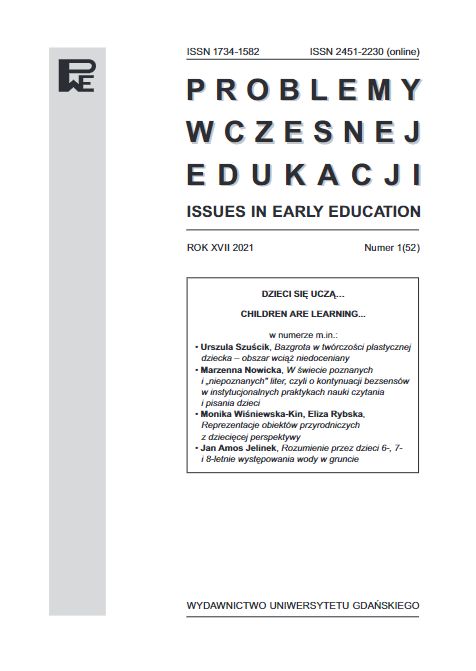Podążając śladem dziecięcego rozumienia świata społecznego. Uwagi na marginesie badań mozaikowych
DOI:
https://doi.org/10.26881/pwe.2021.52.05Słowa kluczowe:
wczesna edukacja społeczna, dziecko aktywny badacz, badania mozaikoweAbstrakt
The text is about social education of children and it presents an approach related to a new paradigm of a child and childhood as well as solutions drawing on constructivism. It highlights the sense of children’s exploration and their active participation in creating knowledge about themselves, others and their social background. The methods used comprise mosaic approach, tours, map-making, using cameras, child conferencing. These methods emphasize a child as an explorer and their active participation in learning new skills and gaining new knowledge. The main idea of the text is, therefore, to show the mosaic research strategy as a chance for professional implementation and achievement of research goals related to learning about the world of children, as well as creating opportunities for attractive and valuable learning about the world by children when they explore their surroundings. This kind of the meeting of two perspectives of a mosaic strategy: methodological as a research method and methodological as a learning method has its potential and interesting perspectives of multilateral application.
Downloads
Bibliografia
Arlin P.K. (1990), Wisdom: The art of problem finding. W: R.J. Sternberg (ed.), Wisdom: Its nature, origin and development. New York, Cambridge University Press.
Barnes D. (1988), Nauczyciel i uczniowie. Od porozumiewania się do kształcenia. Warszawa, WSiP.
Britton J. (1971), Talking to learn. W: D. Barnes (ed.), Language, the learner and the school. Harmondsworth, Penguin.
Berlyne D.E. (1969), Struktura i kierunek myślenia. Warszawa, PWN.
Bruner J. (1965), Proces kształcenia. Warszawa, PWN.
Bruner J. (1978), Poza dostarczone informacje. Studia z psychologii poznania. Warszawa, PWN.
Clark J. (2004), Participatory Research with Children and Young People: Philosophy, Possibilities and Perils. https://www.researchgate.net/publication/233341556_Participatory_research_with_ children_and_young_people_philosophy_possibilitiesand_perils, 21.05.2021.
Clark A. (2005), Talking and listening to children. W: M. Dudek (ed.), Children’s space. Oxford, Elsevier.
Colbert P., Strong J. (2011), Talk for writing. Across to curriculum. New York, Open University Press.
Dahlberg G., Moss P., Pence A. (2013), Poza dyskursem jakości w instytucjach wczesnej opieki i edukacji. Wrocław, Wydawnictwo Naukowe DSW.
Gawlicz K., Rӧhrborn B. (2014), Edukacja przedszkolna: pytanie o demokrację. Warszawa, Biuro Rzecznika Praw Dziecka.
Gopnik A., Meltzoff A.N., Kuhl P.K. (2004), Naukowiec w kołysce. Czego o umyśle nauczą nas małe dzieci. Warszawa, Media Rodzina.
Jay E.S., Perkins D.N. (1997), Problem finding: The search for mechanism. W: M.A. Runco (ed.), The creativity research handbook. Vol. 1. New Jersey, Hampton Press.
Jones M.G., Brader-Araje L. (2002), The Impact of Constructivism on Education: Language, Discourse, and Meaning. „American Communication Journal”, 3. http://ac-journal.org/journal/ vol5/iss3/special/jones.pdf, 16.05.2021.
Kellett M. (2005), Children as Active Researchers: A New Research Paradigm for the 21st Century? Centre for Childhood, Development and Learning, The Open University, http://eprints.ncrm. ac.uk/87/1/MethodsReviewPaperNCRM-003.pdf, 21.05.2021.
Larochelle M., Bednarz N., Garrison J. (eds.) (1998), Constructivism in education. Cambridge University Press, https://books.google.pl/books?hl=pl&lr=&id=6NCq3zyWkNsC&oi=fnd&pg=PR 7&dq=constructivism+in+educa, 16.05.2021.
Lewis D. (1988), Jak wychować zdolne dziecko. Warszawa, PZWL.
McCartan C., Schuboltz D., Murphy J. (2012), The Self-Conscious Researcher – Post-Modern Perspectives of Participatory Research with Young People. „Forum: Qualitative Social Research”, 13, 1, https://www.qualitative-research.net/index.php/fqs/article/view/1798/0, 20.05.2021.
Millar G. (2000), The power of questioning: An enabling strategy to enhance learning. W: E.P. Torrance (ed.), On the edge and keeping on the edge. Connecticut, Ablex Publishing.
Neisser U. (1967), Cognitive psychology. New York, Appleton Century Crofts.
Nęcka E. (1994), TRoP… Twórcze rozwiązywanie problemów. Kraków, Oficyna Wydawnicza „Impuls”.
Piaget J. (1970), Science of Education and the Psychology of the Child. New York, Viking Press.
Piaget J. (1977), Dokąd zmierza edukacja? Warszawa, PWN.
Prout A., James A. (1990), A new paradigm for the sociology of childhood? W: A. James, A. Prout (eds.), Constructing and Deconstructing the Child: Contemporary Issues in the Social Study of Childhood. London, Falmer Press.
Rinaldi C. (1993), The emergent curriculum and social constructivism. W: C. Edwards, L. Gandini, G. Forman (eds.), The hundred of languages of children. Norwood, NJ, Ablex.
Sękowski A.E. (2000), Osiągnięcia uczniów zdolnych. Lublin, Towarzystwo Naukowe KUL.
Smolińska-Theiss B. (2014), Dzieciństwo jako status społeczny. Edukacyjne przywileje dzieci klasy średniej. Warszawa, APS.
Steffe L.P., Gale J. (eds.) (1995), Constructivism in Education. Hillsdale NJ, Lawrence Erlbaum Associates.
Szczepska-Pustkowska M. (2011), Od filozofii dzieciństwa do dziecięcej filozofii życia. Kraków, Oficyna Wydawnicza „Impuls”.
Szmidt K.J. (2006), Teoretyczne i metodyczne podstawy procesu rozwijania zdolności „myślenia pytajnego”. W: W. Limont, K. Nielek-Zawadzka (red.), Dylematy edukacji artystycznej. Edukacja artystyczna a potencja twórczy człowieka. Kraków, Oficyna Wydawnicza „Impuls”.
Szuman S. (1956), Aktywność własna jako czynnik rozwoju dziecka w okresie 7–14 lat. „Nowa Szkoła”, 6.
Zwiernik J. (2012), Podejście mozaikowe w badaniu doświadczania przez dzieci życia codziennego w instytucjach wczesnej opieki i edukacji. „Przegląd Badań Edukacyjnych”, 2.

 Uniwersyteckie Czasopisma Naukowe
Uniwersyteckie Czasopisma Naukowe





